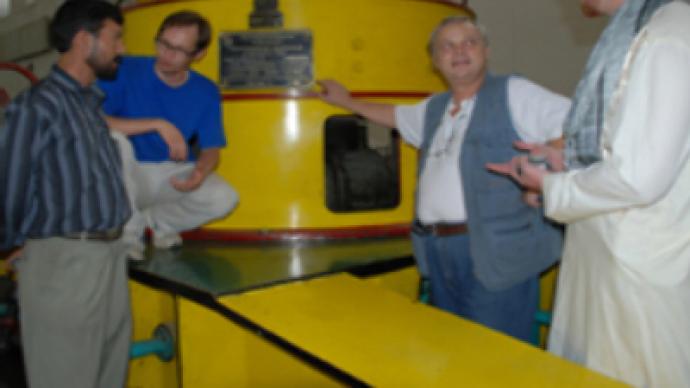Power plant at risk from Taliban

As the Taliban insurgency continues to gain momentum in Afghanistan, the country’s fragile infrastructure is increasingly at risk of attack. Freelance writer Lizette Potgieter spent time at a power plant outside Kabul, and sent RT this special report.
Technopromexport’s Russian specialists have built power plants world-wide which have withstood the hardest test – the test of time. Yet, recent political developments at the Naglu hydro power plant situated half-way between Kabul and Jalalabad in Afghanistan, are casting a shadow over the future of the plant and its workers.
While the plant’s 20 Russian specialists and their Afghan assistants have been able to maintain and modernise the 40-year-old equipment unhindered in the past, escalating violence is now threatening the site.
“Security is the core issue for foreign workers in Afghanistan,” Russian ambassador Mr Zamir Kabulov said. “More than 100 Taliban fighters are actively trying to cut off the road to Jalalabad. I’m collaborating with Mr. Ismail Khan, Minister of Energy, to increase the number of the Afghan police in the area, but the demand simply cannot be met. His relentless efforts have, however, made it possible for us so far to carry out our project successfully.”
Once a month Mr Aleksandr Zhulin, director of Technopromexport Afghanistan, and his deputy, Mr Ivan Grosse, travel from their Kabul head office to the plant to inspect if things are running smoothly. Safety measures are strictly followed so they never leave before 10.30am in the morning to avoid roadside bombs and attacks by insurgents along the way.
“I know we look ridiculous in these clothes,” Zhulin said pointing at the shalwar kameez (traditional Afghan attire) he and his colleague were wearing before getting into their vehicle, “but we wear this so that we’ll appear less conspicuous to insurgents scrutinizing the traffic through their binoculars from the surrounding mountains.”
Their Afghan driver has a pistol hidden in his waist-coat and the security guard totes a machine gun. Along the way the two Russians make a pre-arranged stop to pick up an Afghan soldier who hops into the back of the vehicle with his Kalashnikov for extra protection.
Naglu hydro power plant dominates a narrow valley with the compound nestling on a green riverbank a short distance below. It is a picture of seeming tranquility.
But behind the mountains lurks the danger of uncontrolled territory which stretches all the way to the Pakistan border. The weak Afghan government holds no power there, which means the plant and the Russian workers are under constant threat of possible attacks.
“To make matters worse the US Army has recently suddenly set up a camp 20 metres away from our compound without notice,” Igor Ermakov, the plant’s interpreter, said. “This creates a major problem for us, because we’ve now become a prime target for the Taliban. There was no shooting before they arrived on the scene. The troops are attracting too much attention.”
An increase of foreign forces in this area is causing instability. “Recently ten French soldiers were killed 15 km’s away from the plant in a clash between coalition forces and the Taliban,” Ermakov added with concern.
The staff of the plant often has no communication with the outside world, because of a lack of coverage points. When the US Army is in operation, they cut off the Russians’ coverage.
Out in the middle of nowhere the Russians miss newspapers, Russian food and the presence of women at their compound. The only companions they have are four dogs and a couple of chickens.
“We keep the chickens to keep our compound free of harmful insects and scorpions,” Chief of Admin and Security, Mr Yury Dmitriev said.
In their free time the plant’s workers fish in the river for fun. “I caught a fish this big,” one of the Russians indicated with his hands. But his colleagues all disagreed whole heartedly. “Never trust the tales of a fisherman,” they all laughed.
When a rain storm breaks out unexpectedly and floods the US military camp next door thoughts again return to more serious issues.
“How would we protect ourselves and the plant if the Taliban launched a full scale attack?” Yury said. “We just can’t provide the full scope of security to prevent an armed insurgence.”
Lizette Potgieter for RT












